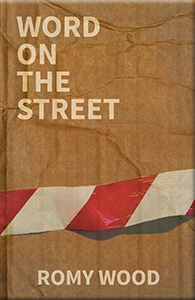Cillian Press, £9.99
 Having arrived on the literary scene with a story set in Bangkok in her first novel, Bamboo Grove, Romy Wood turns her attention to the streets of Cardiff in her second novel Word on the Street. Placing South Wales at the heart of a viral epidemic and opening with the grim tale of a decomposing dog, the novel is not for the faint-hearted. Wood’s narrative weaves a tapestry of dirt, decay and disease among its entertaining cast of characters.
Having arrived on the literary scene with a story set in Bangkok in her first novel, Bamboo Grove, Romy Wood turns her attention to the streets of Cardiff in her second novel Word on the Street. Placing South Wales at the heart of a viral epidemic and opening with the grim tale of a decomposing dog, the novel is not for the faint-hearted. Wood’s narrative weaves a tapestry of dirt, decay and disease among its entertaining cast of characters.
The life of support worker Shona Davies revolves around her job at a local homeless shelter, providing a temporary base to an eclectic mix of characters. When a virulent disease, controversially termed ‘Tramp Flu’ by the media, begins to circulate among the homeless community Shona finds her life consumed by the quest to uncover the true cause of the epidemic. As the epidemic spreads across the class divide, the narrative offers a number of sharp observations about social reactions to such a crisis. As homeless sufferers displaying symptoms are rounded up and taken to ‘warehouses’ specifically created for the purpose, anyone with a fixed address initially gains access to hospital treatment and additional medication.
The ever-present dark humour in Wood’s writing ensures that Shona is not a typical heroine. Far from being strong, healthy and full of purpose, Shona is overweight, unkempt and spends much of the novel taking care of her hypochondriac grandmother and fantasising about a brief, but passionate, affair she had with Daniel, a former guest at the shelter. When Daniel reappears in Shona’s life following the outbreak of ‘Tramp Flu’, she finds herself drawn increasingly into his attempt to locate the source of the disease, driven by her desperation to spend time with him.
Original and imaginative as its plot is, Word on the Street occasionally seems to lose its way structurally. The story is recounted from the future, where Shona recalls the events under the instruction of a creative writing tutor based in the institution where Shona is being held. At times, this approach results in creating a slightly disjointed feel as the first person narrative is interrupted by a justification of Shona’s reasons for recounting her story in this way. Similarly, the abrupt transition between events means that certain scenes are left frustratingly unfinished, such as an episode in which Shona and Daniel spend a considerable amount of time finding a way to secretly enter a closely guarded hospital, only for Shona to confess that she has no idea how they will get out again. The almost immediate narrative shift will leave readers wondering how the pair managed to escape from the heavily policed hospital.
Likewise, more scientifically-minded readers may need to suspend their understanding in order to fully immerse themselves in a story where the medical accuracy of the novel seems, occasionally, to be a little dubious. Yet what it sometimes lacks in medical accuracy the novel certainly makes up for in its evocative depiction of a social hierarchy threatened by an epidemic which it is powerless to control. In particular, Wood’s depiction of media reaction to the crisis is both satirical and astute. At one stage Shona notes that the Minister for Health ‘was on television most of the day; some of it was live, and in between they re-ran and analysed the live interviews’, subtly capturing the inescapable frenzy of contemporary media.
At its heart Word on the Street is a love story, set against the backdrop of an epidemic which threatens to tear the characters’ world apart. As the virulent ‘Tramp Flu’ begins to cross the social divide it also reveals the ugly truth about social prejudice and inequality in modern society. Nevertheless, there are plenty of heart-warming moments, not least in the touching friendship which develops between Shona, a young homeless woman, Fflur, and a mildly autistic former Shelter employee, Colin. Fflur’s efforts to engage with Colin, and brighten the increasingly bleak circumstances in which they live, offer some light relief from the dark scenes of death and social decay. Sharp, dark and thought provoking, Word on the Street offers a fresh perspective of Wales and the lengths society will go to protect itself in a time of crisis.










